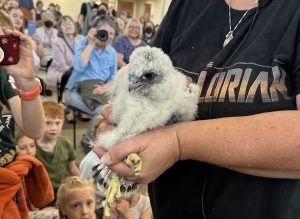Evanston Public Library welcomes baby peregrine falcon
By Karie Angell Luc For Chronicle Media — June 28, 2023
Mary Hennen, ornithologist for The Field Museum, shows the male baby falcon to the audience at the falcon banding event at the Evanston Public Library on June 9. (Photo by Karie Angell Luc)
The announcement on June 9 had people of all ages reacting in delight. It was a boy and he was named Bibli.
Shortly before Mother’s Day on May 14, Bibli, the name of a baby peregrine falcon, hatched on a ledge at the Evanston Public Library. Bibli had a band placed along a talon on June 9 by scientists connected with the Field Museum’s Chicago Peregrine Program.
The community was invited to a public event on the library’s third floor that Friday morning to be a part of the falcon banding experience. More than 200 people attended.
According to an Evanston Public Library news release, peregrine falcons have been nesting on the main library since 2004, a welcome sight after the species were nearly eradicated by pesticides in the mid-twentieth century.
The species has rebounded with the regulation of pollutants, programs like the Chicago Peregrine Project, and the work of volunteers like the birders of the Evanston Peregrine Falcon Watch, according to the library.
“The story of the peregrine falcon’s rebound from near extinction is remarkable, and it only happened because advocates like our partners at the Chicago Peregrine Program, the Evanston Peregrine Falcon Watch, and the wider public cared enough to learn about and advocate to protect our feathered friends,” the library’s Interim Executive Director Heather Norborg said.
Peregrines are fast flyers and can reach speeds of up to 69 mph when pursuing prey.
Bibli’s name complemented a name given to the unnamed falcon’s mother, Teca. The two names, put together, are suggestive of the word, “Biblioteca” which means library in Spanish.
Over the years, a naming contest has named chicks like Bibli who were hatched at the library. Peregrine falcons have an approximate 10-year life span and remain in nests, called scrapes, from March until June during the chick rearing season.
A blood sample was taken that Friday to assess the chick’s health. Ornithologists oversee the banding process of the baby falcons to track their flight pattern into senior adulthood.
Mary Hennen, ornithologist for The Field Museum, told the audience that banding allows scientists to track the chick as, “it goes somewhere in the future, we see it and can learn … where it goes and how long it lives.”
The egg producing couple, a male named Coach Kevin and the female Teca, laid three eggs and Bibli was the only hatchling.
Hennen said even with one hatchling among other eggs which don’t hatch. “We’re just as happy with the one.”
People were invited to view the bird within close proximity but could not pet the wildlife.
Nicole Van Laan of Evanston, attended with children George, 6, a rising first-grader, Louis, 2, Daphne, 4, a rising preschooler.
Nicole Van Laan hoped the children would learn, “more about nature.”
Evanston siblings Avery Jenkins, 8, a rising third-grader and Sullivan Jenkins, 6, a rising first-grader were accompanied by their parent Petina Dixon-Jenkins.
“We always see all the big birds in the neighborhood and they’re really excited to see one up close,” Dixon-Jenkins said about Avery and Sullivan.
Watch and hear the birds live at epl.org/falconcam.







